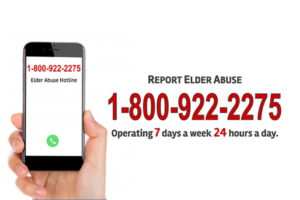Jan 28, 2022
 Did you know that approximately 1 in 10 older Americans has reported experiencing some of form of elder abuse? However, research has indicated that only about 1 in 24 cases of abuse are reported to authorities. The U.S. Department of Health and Human services estimates that five-million older Americans are abused annually.
Did you know that approximately 1 in 10 older Americans has reported experiencing some of form of elder abuse? However, research has indicated that only about 1 in 24 cases of abuse are reported to authorities. The U.S. Department of Health and Human services estimates that five-million older Americans are abused annually.
SeniorCare’s Adult Protective Services Department saw a decrease in elder abuse reports in the early months of the pandemic. It is thought that this lower number of reports was a result of social distancing requirements, which further secluded a segment of society that was already experiencing severe isolation. As we have started to return to socializing, reports of elder abuse have risen considerably. Last month (December 2021), SeniorCare received a significant number of reports—many of which resulted in investigations after the preliminary situation review.
Elder abuse is “an act or omission, which results in a serious physical or emotional injury to an elderly person or financial exploitation of an elderly person; or the failure, inability or resistance of an elderly person to provide for himself or herself one or more of the necessities essential for physical and emotional well-being without which the elderly person would be unable to safely remain in the community.” The Commonwealth of Massachusetts recognizes anyone age 60 or over as an elder. Elder abused conditions include physical abuse, sexual abuse, emotional abuse, financial exploitation, neglect, and self-neglect.
Social isolation and mental impairment (such as Alzheimer’s disease or another dementia) are two major contributors to why elders are more vulnerable to abuse. Research shows that nearly half of people living with dementia experience some form of elder abuse or neglect.
What can an older person do to prevent being the victim of elder abuse? The National Council on Aging offers the following advice.
- Take care of your health.
- Seek professional help for drug, alcohol, and depression concerns and urge family members to get help for these problems.
- Attend support groups for spouses and learn about domestic violence services.
- Plan for your own future. With a power of attorney or a living will, you can address health care decisions now to avoid confusion and family problems later. Seek independent advice from someone you trust before signing any documents.
- Stay active in the community and connected with friends and family. This will decrease social isolation, which has been connected to elder abuse.
- Post and open your own mail.
- Do not give out personal information over the phone.
- Use direct deposit for all checks.
- Have your own phone.
- Review your will periodically.
- Know your rights. If you engage the services of a paid or family caregiver, you have the right to voice your preferences and concerns. If you live in a nursing home, call your Long Term Care Ombudsman. The Ombudsman is your advocate and has the power to intervene.
How might a family member, friend, or caregiver recognize elder abuse? The National Institutes for Health lists the following warning signs.
- Stops taking part in activities he or she enjoys
- Looks messy, with unwashed hair or dirty clothes
- Has trouble sleeping
- Loses weight for no reason
- Becomes withdrawn or acts agitated or violent
- Displays signs of trauma, like rocking back and forth
- Has unexplained bruises, burns, cuts, or scars
- Has broken eyeglasses/frames, or physical signs of punishment or being restrained
- Develops bed sores or other preventable conditions
- Lacks medical aids (glasses, walker, dentures, hearing aid, medications)
- Has an eviction notice for unpaid rent, notice of late mortgage, or home eviction
- Has hazardous, unsafe, or unclean living conditions
- Displays signs of insufficient care or unpaid bills despite adequate financial resources
Anyone can report elder abuse. If you are concerned about an older adult (age 60 or older), and have reason to believe they are a victim of elder abuse, neglect, self-neglect, or financial exploitation call the Massachusetts-based Elder Abuse Hotline at 1-800-922-2275. Every community in Massachusetts is covered by a designated Protective Service Agency. All reports will be referred to and handled by the designated Protective Service Agency. The agency will determine if an investigation is warranted. If needed, the situation will be investigated and the best course of action to alleviate the risk will be determined. You can also file a report online. The online reporting link can be found at www.seniorcareinc.org/protective-services. However, you should never use the online reporting system for an emergency situation that requires immediate attention.
SeniorCare’s Adult Protective Services Department regularly offers workshops on how to prevent and identify elder abuse. To learn more or to schedule a presentation, call SeniorCare at 978-281-1750 and ask to speak with the Director of Protective Services.
